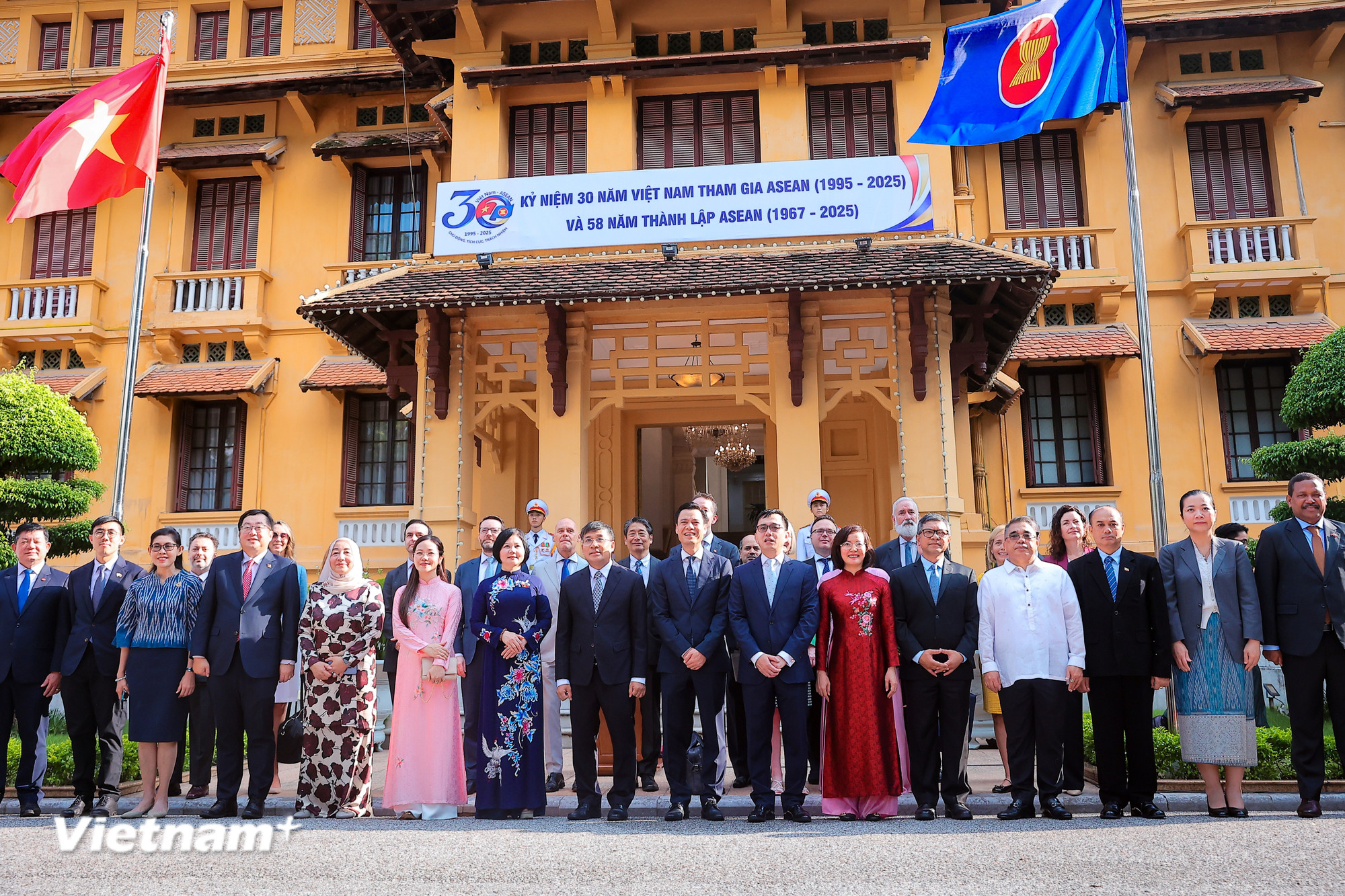 |
| ASEAN flag-raising ceremony at the headquarters of the Vietnamese Ministry of Foreign Affairs . (Photo: VNA) |
From a small country that was once a colony and was devastated by war, today, in the eyes of international friends, Vietnam is a developing country with an increasing role and position in the region.
The red flag with yellow star flying in front of the United Nations building in the United States, the ASEAN Secretariat headquarters in Indonesia, the United Nations Peacekeeping Mission in Central Africa or natural disaster "hotspots" in Turkey, Myanmar... shows Vietnam's presence and increasingly proactive, positive, and responsible contributions in solving common problems of the international community.
Looking out to the world , more proud of Vietnam
Looking back at Vietnam's international relations since the country gained independence and established the Democratic Republic of Vietnam (1945), Deputy Prime Minister and Minister of Foreign Affairs Bui Thanh Son affirmed that Vietnamese diplomacy has always devoted itself to serving the nation and people, making many worthy contributions to the common achievements of historical significance of the country.
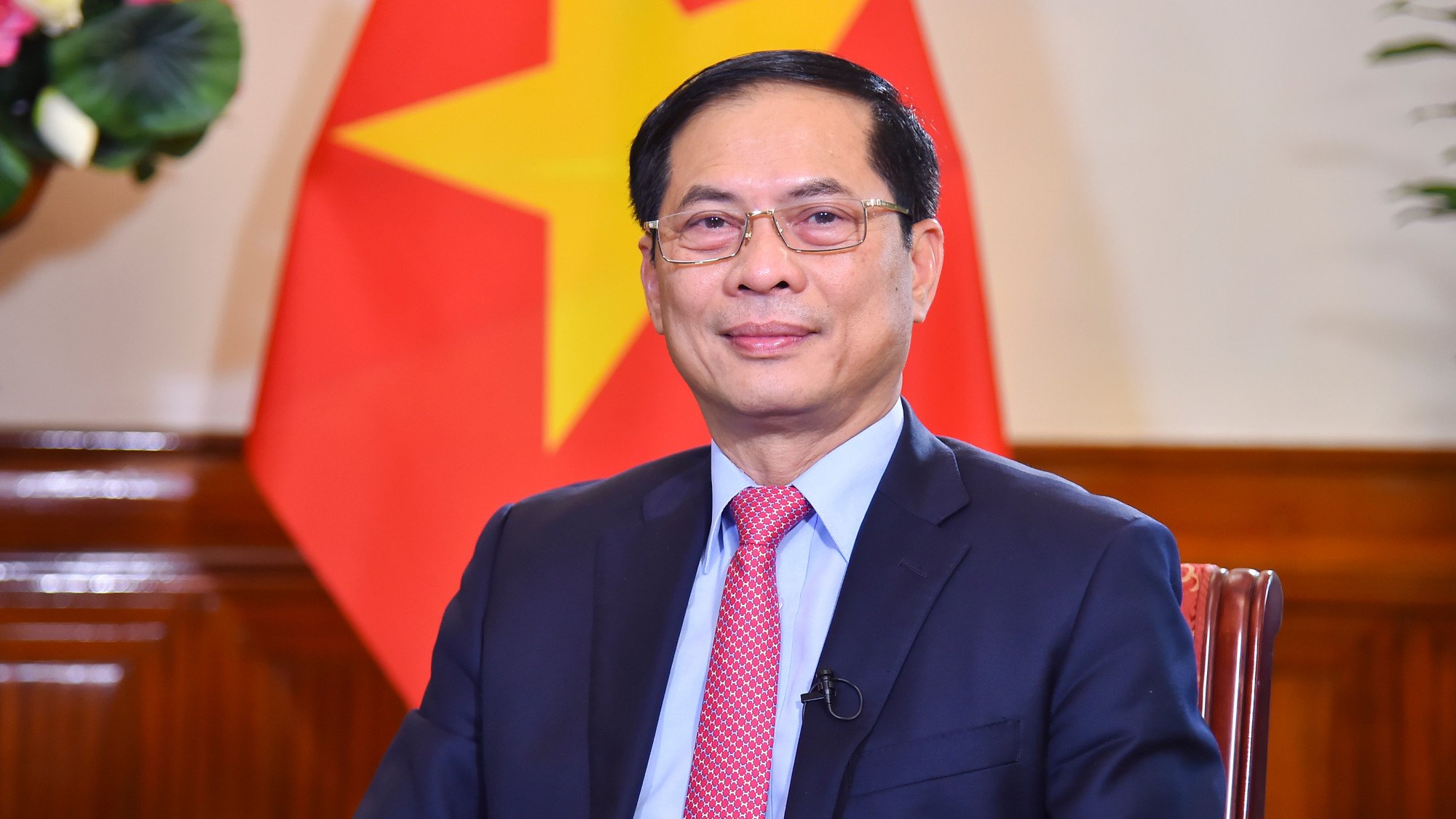 |
| Deputy Prime Minister and Minister of Foreign Affairs Bui Thanh Son. (Photo: BNG) |
Right from the early days of the founding of the country, President Ho Chi Minh used diplomacy as a sharp weapon to make more friends and fewer enemies, divide the enemy ranks, maintain the young government, and gain more time and forces for the long-term resistance war. During the struggle for national liberation and national unification, along with the political and military fronts, diplomacy became an important front with strategic significance. Diplomacy contributed to concretizing victories on the battlefield into victories at the negotiating table, ending the war.
The Preliminary Agreement of March 6, the Provisional Agreement of September 14, the Geneva Agreement of 1954 and the Paris Agreement of 1973 became brilliant milestones in the history of revolutionary diplomacy, contributing to the historic victory of Spring 1975, reuniting the country. Thus, side by side with the combined arms of the Vietnamese Revolution, diplomacy contributed to ending more than a century of slavery under the yoke of colonialism and imperialism, bringing the country into an era of independence, unity and development.
After the country's reunification, diplomacy played an important role in building peace, breaking the siege and embargo, expanding the foreign policy with an independent, autonomous, multilateral, and diversified foreign policy for peace, cooperation, and development. Diplomacy took the lead in gradually integrating the country into the region and the world, especially through historical milestones such as joining ASEAN, APEC, WTO, etc. and signing and participating in hundreds of international agreements and treaties.
According to the Deputy Prime Minister and Minister of Foreign Affairs, the country's nearly 40-year history of Renovation has affirmed the extremely important role of diplomacy on all three pillars of Party diplomacy, State diplomacy and People's diplomacy.
Important fields from political diplomacy, economic diplomacy, cultural diplomacy, border and territorial affairs, foreign information and propaganda, consular work, work with overseas Vietnamese, and industry building have all achieved many important results.
“Diplomacy has contributed to expanding and deepening relations with partners; closely coordinating with national defense and security to maintain the independence, sovereignty, unity and territorial integrity of the Fatherland, contributing to defending the country early, from afar, before the country is in danger; protecting the legitimate rights and interests of the country, people and businesses; mobilizing the contributions of overseas Vietnamese, contributing to promoting the cause of great national unity; actively promoting the image of the country,” Mr. Bui Thanh Son emphasized.
In particular, economic diplomacy has become a central task, an important driving force for national development. Vietnam has attracted hundreds of billions of USD in FDI capital, becoming one of the Top 20 countries with the largest trade scale in the world, and an important link in 17 FTAs connecting us with more than 60 important economies in the world. During the COVID-19 pandemic, the great contribution of vaccine diplomacy has been recognized and commended many times by Party and State leaders.
Thanks to those important contributions, foreign affairs are considered by Party and State leaders to be an impressive highlight in the country's overall achievements.
Over the past 8 decades, from being "alone and isolated", Vietnam has established diplomatic relations with 194 countries, built a network of strategic partnerships and comprehensive partnerships with 37 countries, including all major countries and all 5 permanent members of the United Nations Security Council; and is an active member of more than 70 international and regional organizations. Our Party has also established relations with 259 political parties in 119 countries.
From the status of a country considered "weak", today, in the eyes of international friends, Vietnam is a middle-ranking country with an increasing role and position in ASEAN and the region, making increasingly proactive and positive contributions to participating in solving common tasks of the international community.
Commenting on the national position, Deputy Minister of Culture, Sports and Tourism Le Hai Binh said that the image of the country and its people, history, cultural features, and typical images of Vietnam have been receiving great attention and follow-up from public opinion, appearing with high frequency on prestigious international media channels on the Internet.
“In the context of a volatile and complex world, Vietnam is seen by countries, including the West, as a model worth learning from on how to ‘steer a boat in strong winds.’ The more we look out into the world, the more proud we are of the country and people of Vietnam,” said Deputy Minister Le Hai Binh.
Sharing with VietnamPlus Electronic Newspaper, Mr. Choi Seung Jin, Director of the Korean Cultural Center in Vietnam, also affirmed Vietnam's increasingly prestigious position in the international arena.
According to Mr. Choi Seung Jin, Vietnam has been performing many roles and is constantly expanding those roles.
For example, in April 2025, Vietnam successfully hosted the Partnership for Green Growth and the Global Goals (P4G) Summit, demonstrating its leading voice in the field of environment and sustainable development.
“With rapid economic growth, Vietnam is also one of the leading countries in solving global issues. Korea and Vietnam are also cooperating through the APEC mechanism. This year, Korea will host the APEC Summit and it is expected that in 2027, Vietnam will host this conference in Phu Quoc. This shows that Vietnam's international role and cooperation activities between Vietnam and Korea will be further strengthened,” said Mr. Choi Seung Jin.
Cultural diplomacy enhances national status
After 80 years of national founding and nearly 40 years of innovation, Vietnam is steadily entering an era of self-reliance and deeper and more comprehensive international integration.
The process of international integration is not only limited to the economic field but also extends to fields such as culture, education, science and technology, contributing to the comprehensive development of the country.
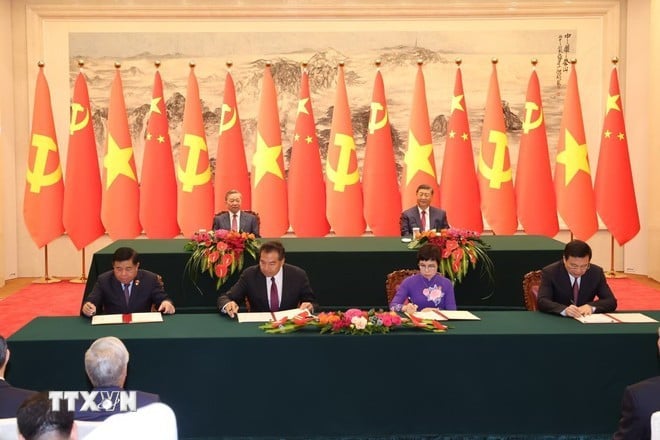 |
| General Secretary To Lam and General Secretary and President of China Xi Jinping witnessed the signing of a cooperation document by the two countries' partners. (Photo: VNA) |
The top priority in the new era is to successfully implement the strategic goals by 2030, Vietnam will become a developing country with modern industry and high average income; by 2045 it will become a developed socialist country with high income; strongly arouse national spirit, spirit of self-reliance, self-confidence, self-reliance, national pride, and aspiration for national development; closely combine national strength with the strength of the times.
According to Associate Professor-Doctor Dang Dinh Quy, former Deputy Minister of Foreign Affairs, former Director of the Diplomatic Academy, to achieve the goals of 2030 and 2045, our entire nation must make outstanding efforts in all fields.
Specifically, it is necessary to contribute more effectively to the goal of protecting national security; secondly, it is necessary to contribute more effectively to the country's development goals.
“To achieve that goal, we must mobilize external resources, first of all high technology, export markets and high-quality capital. Accordingly, we need to create and consolidate a large and sustainable network of friends and partners, especially partners with potential in technology and markets, with fundamental and long-term coincident interests in the process of Vietnam becoming a developed country,” Associate Professor, Dr. Dang Dinh Quy proposed a solution.
In that process, Vietnam must enhance and promote its international position because a high position will gain support and cooperation from countries and partners. A high position is also an important condition for accessing high-quality technology and capital sources at reasonable prices.
In promoting foreign policy goals and dealing with issues arising in relations with partners, especially major partners, foreign affairs must also be ready to commit to protecting principles that are recognized and respected by the majority of countries in the international community. In addition, foreign affairs must also effectively promote the country's international position to serve the goals of promoting development and ensuring national security.
“To increase its position in the era of national growth, foreign affairs need to have a new approach in implementing the orientation of being a 'responsible member of the international community', being more proactive, positive, and responsible in common regional and international affairs, and being ready to contribute resources, including human and financial resources, to these tasks,” Mr. Quy said.
Recently, the Government has assigned the Ministry of Culture, Sports and Tourism to draft a Communication Strategy to promote Vietnam's image abroad to affirm its worthy position on the world map. The strategy focuses on "Positioning the national image" with 4 core characteristics: Stability, Development, Innovation, and Rich cultural identity.
Responding to VietnamPlus Online Newspaper about solutions to promote national image, Associate Professor - Doctor Nguyen Ngoc Oanh, Head of the Department of International Relations, Academy of Journalism and Communication, said that now is an important time to build a communication strategy to enhance the position and identity of the national image.
“Previously, the world knew Vietnam as a country of war, pain, and poverty. Now is the time for us to build the image of a developing Vietnam, with a growing economy and happy people. Now is the time for cultural diplomacy to be paid more attention,” Mr. Nguyen Ngoc Oanh affirmed.
Mr. Oanh emphasized that this is a correct policy, all ministries and sectors need to support it consistently, not just the task of the Ministry of Culture, Sports and Tourism.
The strategy needs to cover many aspects and areas. Promotional content needs to be unified, with specific goals defined, for example, if the tourism industry needs to attract a large number of visitors, how should it be communicated? If it needs to attract a high-quality, high-spending customer base, how should it be communicated?
Sharing experience from Korea – a country that has successfully used culture as a tool to increase its influence and international status, creating connections and trust with other countries thanks to the “Hallyu wave” (Korean popular culture), Mr. Choi Seung Jin, Director of the Korean Cultural Center in Vietnam, shared: “I know that Vietnam is actively promoting its national image based on its long-standing historical culture, rich identity and beautiful natural landscapes. You should actively promote those images to the world and create a comprehensive image of Vietnam to international friends,” said Mr. Choi Seung Jin.
The Korean cultural expert also proposed a long-term investment strategy to tell Vietnam’s story through the creative industry. He said that Vietnam and Korea can cooperate in this field, such as co-producing cultural content, through which the two countries can achieve development achievements in the cultural industry and promote the national image.
Multilateral diplomacy needs to closely coordinate with the country's foreign affairs "arms", continue to promote and enhance Vietnam's participation and contributions in regional and international multilateral forums, commensurate with the country's stature and position. Deputy Minister of Foreign Affairs Do Hung Viet |
Regarding the orientation of implementing Vietnam's multilateral diplomacy in the coming time, Deputy Minister of Foreign Affairs Do Hung Viet affirmed that multilateral diplomacy needs to closely coordinate with the country's foreign affairs "arms", continue to promote and enhance Vietnam's participation and contributions in regional and international multilateral forums, commensurate with the country's stature and position.
In terms of thinking, continue to thoroughly and effectively implement the Resolution of the 13th National Party Congress, the Party and State's guiding documents on foreign affairs and international integration; consistently implement the foreign policy of independence, self-reliance, diversification and multilateralization on the basis of ensuring the highest national interests.
Regarding measures, clearly identifying the focus and key points, while ensuring connectivity and synchronization in participating in various regional and international multilateral forums, is of utmost importance. In addition to "nurturing" the content and initiatives that Vietnam has prioritized and promoted consistently, Vietnam needs to proactively seize opportunities, be ready to participate as well as propose new initiatives suitable to the current needs and situations in areas such as green transformation, digital transformation, science and technology, AI, energy transformation, climate change response, energy security, food security and other non-traditional security challenges.
Regarding implementation, ensure close coordination between internal and external parties, inter-sectoral coordination, especially through coordination mechanisms and regular exchanges between departments, ministries, branches, localities and enterprises to ensure unity of thinking and consensus in action.
Domestically, effectively implement treaties, agreements, and international commitments that Vietnam participates in and promotes; build and perfect the legal framework and appropriate implementation mechanisms to meet the implementation of international commitments and obligations. In addition, promote innovation, organize and arrange the apparatus to implement multilateral foreign affairs to be streamlined, operate effectively and efficiently, and increase investment in financial and human resources for multilateral foreign affairs commensurate with Vietnam's potential and position.
With the proposed direction, multilateral diplomacy will certainly continue to accompany and contribute to creating favorable momentum to bring the country firmly into a new era, an era of the Vietnamese people's rise./.
AMM-58 Conference: Vietnam affirms its proactive and active foreign policy role
Deputy Prime Minister and Foreign Minister Bui Thanh Son met with many leaders of partner countries such as the US, EU, UK, Pakistan, China, Algeria, Australia, Japan and Switzerland.
Imprints of Vietnamese Diplomacy 1995: Vietnam officially joined the Association of Southeast Asian Nations (ASEAN), marking an important turning point in the regional integration process. 2000: Signing of the Vietnam-US Bilateral Trade Agreement (BTA), opening up new opportunities for exports and attracting investment. 2007: Vietnam became a member of the World Trade Organization (WTO), committed to opening its market and complying with international trade regulations. 2015: Vietnam was one of the first countries to sign the Trans-Pacific Partnership (TPP), although the United States later withdrew and agreed to replace it with the Comprehensive and Progressive Agreement for Trans-Pacific Partnership (CPTPP). 2018: Vietnam signed the CPTPP Agreement, demonstrating a stronger commitment to international economic integration. 2019: Signing of the Vietnam - European Union Free Trade Agreement (EVFTA), opening new doors for trade and investment between Vietnam and EU countries. 2020: Vietnam signed the Regional Comprehensive Economic Partnership (RCEP) - a free trade agreement between ASEAN member states and five partner countries: Australia, China, Japan, South Korea and New Zealand, forming one of the world's largest free trade blocs in terms of population and GDP. To date, Vietnam has participated in more than 70 international organizations, associations and forums, including the Association of Southeast Asian Nations (ASEAN), the Asia-Pacific Economic Cooperation (APEC), the World Trade Organization (WTO) and especially the United Nations. The country has economic and trade relations with 230 countries and territories. In particular, Vietnam has participated in more than 500 bilateral and multilateral agreements, including 17 free trade agreements, including the Comprehensive and Progressive Agreement for Trans-Pacific Partnership (CPTPP). Vietnam has established increasingly deep relations with all 193 countries and territories that are members of the United Nations (UN), including special relations with 3 countries, established comprehensive strategic partnerships with 13 countries and strategic partnerships with 11 countries. The Vietnamese National Assembly is also a member of Asian parliaments and the Inter-Parliamentary Union General Assembly. The Vietnam Fatherland Front and Vietnamese organizations also participate in practical foreign cooperation mechanisms with 1,200 people's organizations and foreign partners. |
Source: https://huengaynay.vn/chinh-tri-xa-hoi/theo-dong-thoi-su/ngoai-giao-viet-nam-8-thap-ky-tan-tuy-phung-su-quoc-gia-dan-toc-157072.html








![[Photo] General Secretary To Lam attends the 80th anniversary of Vietnam's diplomacy](https://vphoto.vietnam.vn/thumb/1200x675/vietnam/resource/IMAGE/2025/8/25/3dc715efdbf74937b6fe8072bac5cb30)

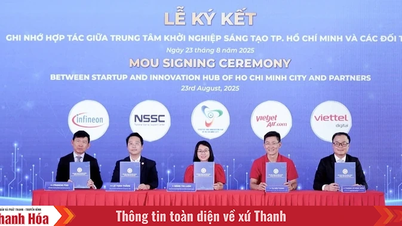

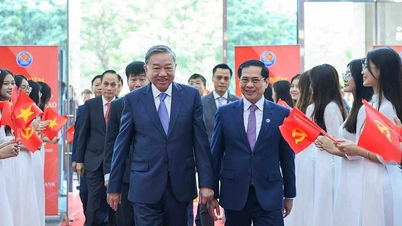


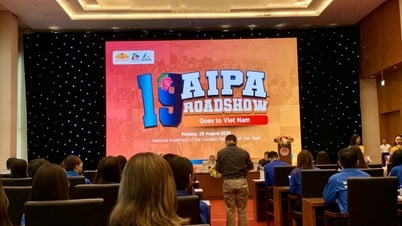

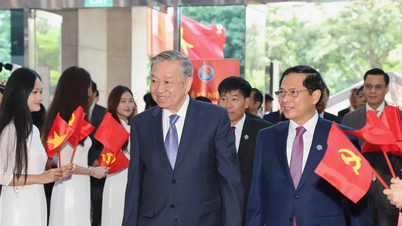

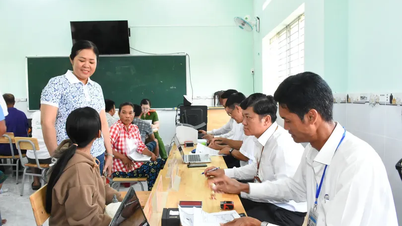



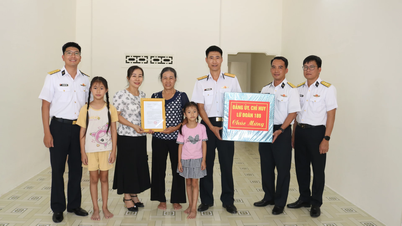
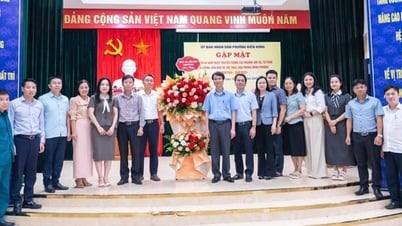

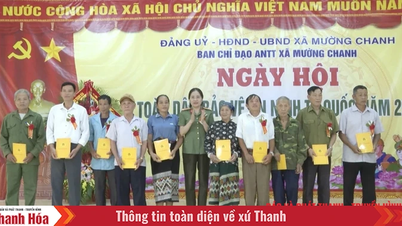
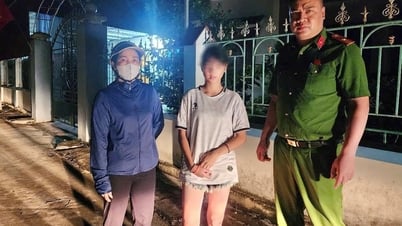





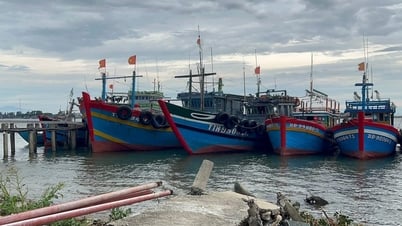
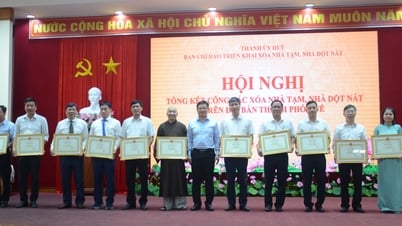
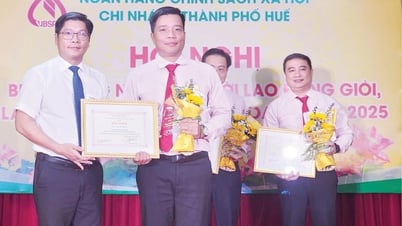
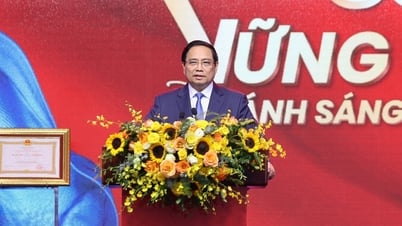
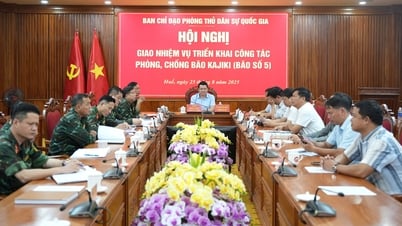
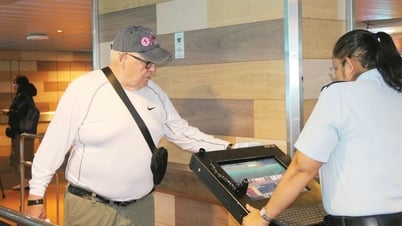

















































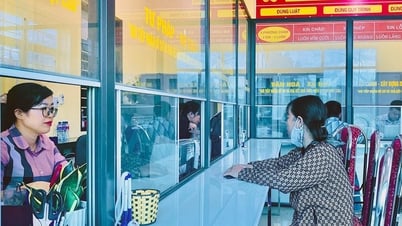

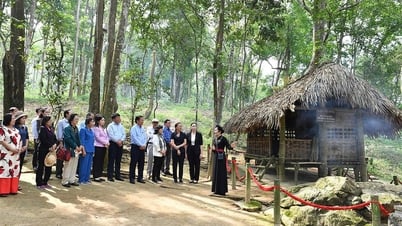
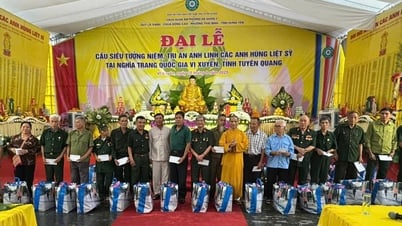

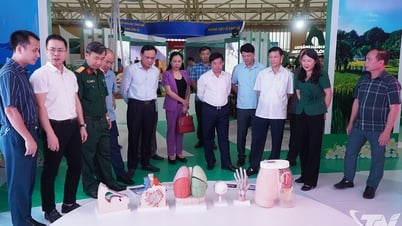

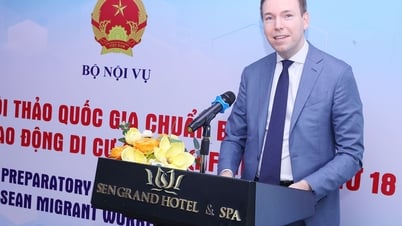










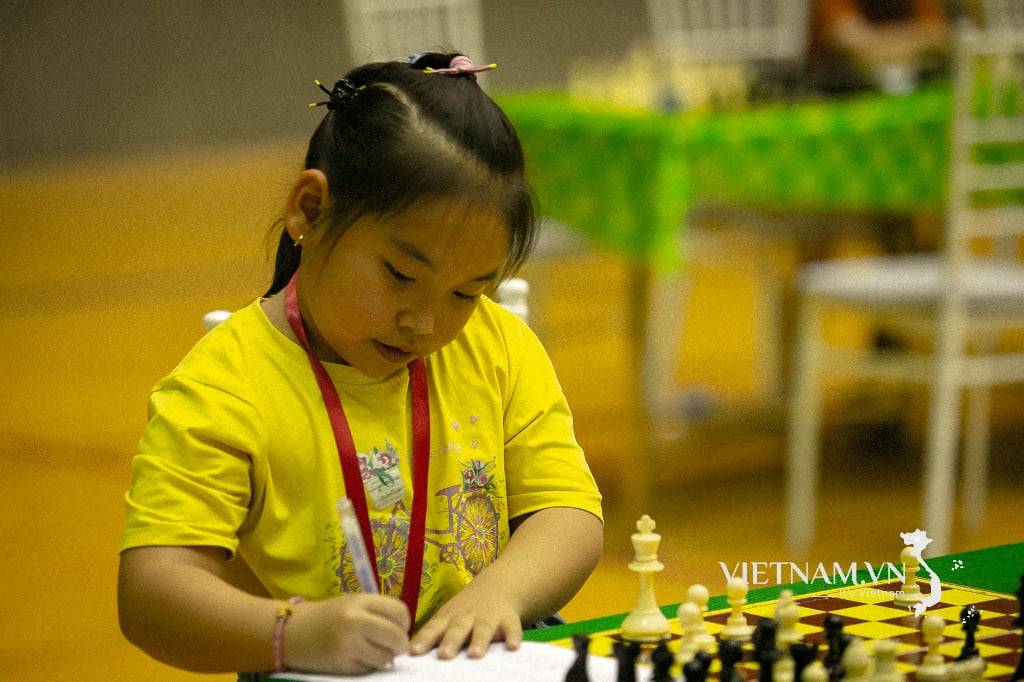



Comment (0)